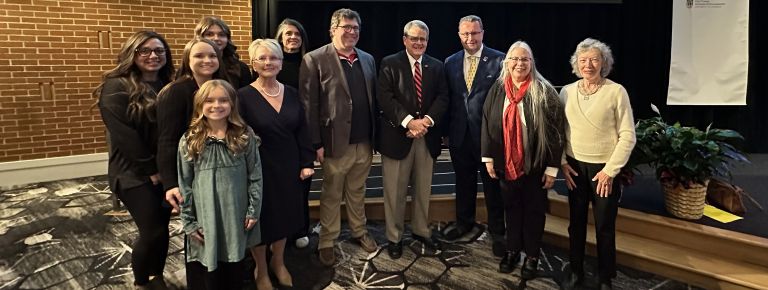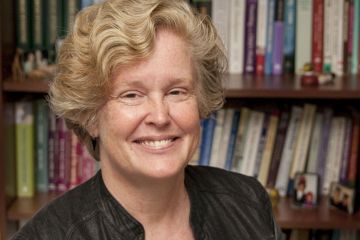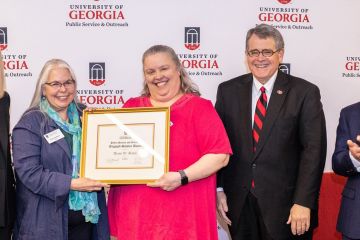UGA dedicates Ralston Center for Behavioral Health and Developmental Disabilities
On the day he announced sweeping reforms to the failed healthcare delivery system for Georgians with mental health challenges, the late state representative David Ralston simply said, “Hope won.”
The bill Ralston championed in 2022 addressed systemic barriers to the quality and delivery of behavioral health services and required insurance companies to cover mental health and substance abuse issues as they would physical illnesses.
“Countless Georgians will know we have heard their despair and frustration,” said Ralston, then speaker of the Georgia House of Representatives who died not long after the signing of the legislation.
The University of Georgia is building on Ralston’s legacy with the establishment of the David Ralston Center for Behavioral Health and Developmental Disabilities.
Housed in the UGA College of Family and Consumer Sciences (FACS), the Ralston Center will prepare future professionals for careers in the behavioral health and developmental and intellectual disabilities fields with the goal of creating a pipeline to provide a community-based system of care.
UGA President Jere Morehead joined FACS Dean Anisa Zvonkovic and Kevin Tanner, commissioner of the Georgia Department of Behavioral Health and Developmental Disabilities, at a dedication ceremony announcing the Ralston Center on Sunday. The state legislature allocated $1.5 million for the establishment of the Ralston Center in its 2025 budget.
Morehead acknowledged Ralston’s lasting impact on UGA and the state in remarks made during the dedication ceremony, which was hosted in conjunction with the Biennial Institute for Georgia Legislators, an orientation for new legislators sponsored by UGA’s Carl Vinson Institute of Government.
Morehead noted he and Ralston were classmates at the UGA School of Law and close friends.
“David was a person with the highest integrity, an inspiring work ethic and a tremendous concern for others,” Morehead said. “As a political leader, he worked across the aisle to pass measures that would benefit all Georgians, as he did for mental healthcare reform. I think he would be proud of the Ralston Center, and I appreciate every state leader who played a role in its creation.”
Both Morehead and Zvonkovic noted the university’s strengths in teaching, research and outreach and its ability to leverage an existing network of collaborators make it an ideal home for the new center.
“The center will reflect former speaker Ralston’s vision for a behavioral health system that provides sustained support based on the strengths, wellness and goals of the person and is built on existing networks, resources and treatment options throughout the state,” Zvonkovic said. “As we launch the center, we are eager to collaborate with faculty across the entire University System of Georgia to coordinate curriculum offerings and other trainings to assist the state to be able to establish the workforce for these issues.”
Tanner, who chaired the Georgia Behavioral Health Reform and Innovation committee formed in 2019 to produce recommendations that led to the legislation, said addressing those workforce needs will be a priority for the center.
“Put simply, hiring and retaining top quality talent in the mental health care sector is the greatest challenge facing our system of care,” Tanner said. “We do not have enough trained, licensed clinicians to meet demand. As UGA’s faculty and administration stand up the Ralston Center, I am certain they will keep this fact top of mind and use the center to help us meet the extraordinary workforce demands we face.”
Tanner added that the establishment of the center at UGA is a fitting continuation of Ralston’s vision.
“Speaker Ralston knew this effort would take years to bring to complete fruition,” he said. “His vision went beyond the role of legislature – it extended to our university system and the pivotal role UGA will play in this work. Ultimately, I think he would see this center’s establishment as one more step toward success – a milestone on a long but worthwhile journey to improve the lives of Georgians.”




